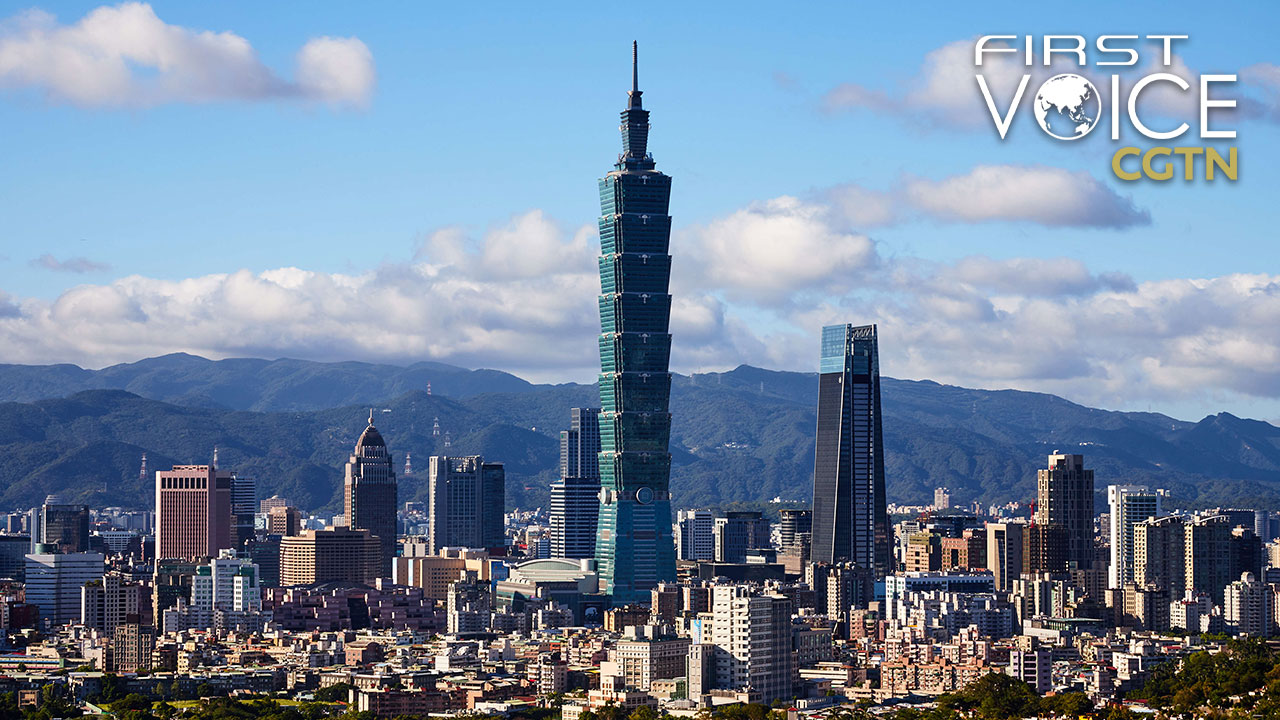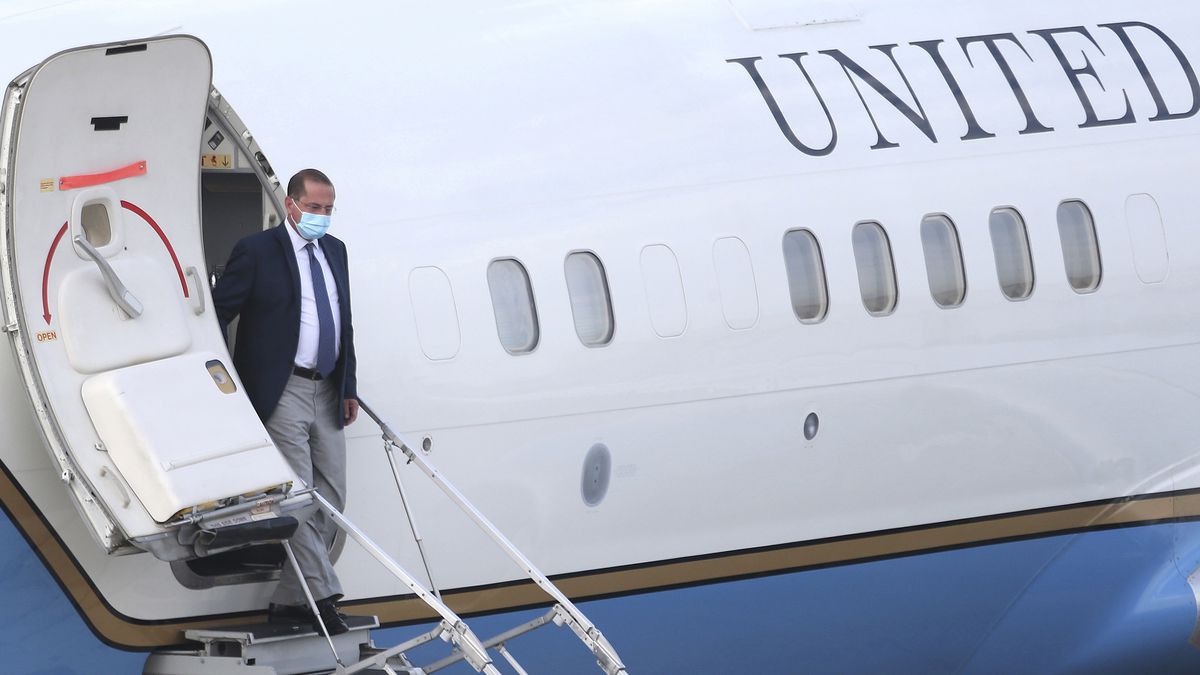
Editor's note: CGTN's First Voice provides instant commentary on breaking stories. The daily column clarifies emerging issues and better defines the news agenda, offering a Chinese perspective on the latest global events.
"If China does try something in Taiwan, we will militarily respond?" NBC Host Chuck Todd asked U.S. Secretary of State Anthony Blinken on Sunday, April 11.
Blinken responded: "I'm not going to get into hypotheticals. All I can tell you is we have a serious commitment to Taiwan being able to defend itself; we have a serious commitment to peace and security in the Western Pacific; and, in that context, it would be a serious mistake for anyone to try to change that status quo by force."
This statement is described by Hofstra University Professor Julian Ku as "strategic ambiguity," a kind of "we will see if our commitment really commits once we get there" platitude that's typical to a bureaucratic politician and an administration filled by such officials.
Taiwan is China's core national interest. It is a matter of national sovereignty, security and identity. In 2019, Chinese President Xi Jinping publicly stated that China reserves the right to use force for reunification and will use all necessary measures that target outside forces and "Taiwan independence" activities. For a career foreign policy guy like Blinken and his boss who spent a decade on the Senate Foreign Relations Committee, China's unshakeable stance on national reunification is well-known.

U.S. Secretary of State Antony Blinken testifies before the House Committee on Foreign Affairs on the Biden administration's priorities for U.S. foreign policy on Capitol Hill in Washington, DC., U.S., March 10, 2021. /Getty
U.S. Secretary of State Antony Blinken testifies before the House Committee on Foreign Affairs on the Biden administration's priorities for U.S. foreign policy on Capitol Hill in Washington, DC., U.S., March 10, 2021. /Getty
However, on the U.S. side, its commitment has always been less than assured. The Taiwan Relations Act states that the U.S. will "make available to Taiwan such defense articles and defense services" for Taiwan to "maintain a sufficient self-defense capabilities." What are the "defense articles and defense services"? No one knows, because that's up to the U.S. president and Congress to decide.
This leaves more than enough wiggle room for the U.S. to extricate itself from Taiwan if it deems maintaining its self-defense capabilities to no longer be worth it. Just like "not getting into hypotheticals" or "serious commitment," these are forms of politically safe rhetoric that show the U.S. is still adhering to the law without making an irreversible position.
"No statement, doctrine or security agreement compels the United States to come to Taiwan's rescue," a recent New York Times article stated.
That lack of doctrine or security agreement has been essential in keeping the regional stability and the relationship between the Chinese mainland and Taiwan manageable. The Chinese mainland doesn't want to use force to reunify unless it is absolutely necessary and, despite the ups and downs through decades, the U.S. has shown similar taste toward maintaining this balance.
That is, until the Trump administration came into power.
The previous administration not only hyped-up the anti-China rhetoric in the United States, but also deliberately used Taiwan as a pressure point in its China strategy. With several legislation packages, visits from high-level officials and the cabinet secretary and the constant rhetoric support by senior diplomats and even the vice president, Donald Trump's administration fundamentally challenged the calculus on Taiwan.

U.S. Health and Human Services Secretary Alex Azar arrives at Taipei Songshan Airport in Taipei, Taiwan, China, August 9, 2020. /AP
U.S. Health and Human Services Secretary Alex Azar arrives at Taipei Songshan Airport in Taipei, Taiwan, China, August 9, 2020. /AP
Supporters for "Taiwan independence" have been bolstered by Tsai Ing-wen's wins in the election, and then emboldened by the sudden U.S. support. In a 2019 Pew Research Center poll, 75 percent of adults surveyed identify themselves as Taiwanese only. According to a 2017 survey in Taiwan, 40.5 percent of respondents believed that the U.S. would provide troops to Taiwan if war ever breaks out. That number jumped to 53.2 percent in 2020.
Blinken seems to be returning to the former strategic ambiguity. However, just a couple of days before his interview, the State Department eased decades-old restrictions on U.S. officials meeting with "Taiwan representatives," which, according to reports, would allow U.S. officials to regularly host "Taiwan representatives" in federal government buildings. The easing of restrictions was something that Blinken's predecessor Mike Pompeo tried to do during the last weeks of the Trump administration. It seems that, whatever the rhetoric is, what Pompeo intended lives on in the new top diplomat of the United States.
That is dangerous. If the U.S.' actions continue to give signals and feed the independence-leaning frenzy in Taiwan, then the status quo that's keeping everyone's powder dry at the moment could soon be tipped off. The slightest miscalculation in the region could entail devastating consequences that none want to see.
If that day comes, we might all see if the U.S. realizes just how serious a mistake it is to upset the status quo.
Scriptwriter: Huang Jiyuan
(If you want to contribute and have specific expertise, please contact us at opinions@cgtn.com.)

